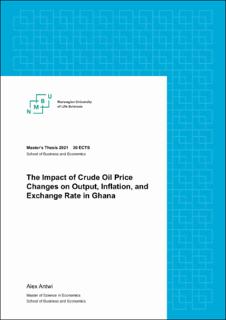| dc.description.abstract | With oil being an integral of Ghana’s economy, Ghana largely depends on the importation of crude oil to meet its numerous needs. This high dependency on oil products in the economy causes macroeconomic variables such as output, inflation, and the exchange rate to be highly affected by changes in the international crude oil price. For this reason, this study aimed to establish the impact of international crude oil price changes on GDP, inflation, and the exchange rate in Ghana. The study employed Vector Autoregression (VAR) to analyze the impact of oil price fluctuation on output, inflation, and the exchange rate in Ghana. Unlike previous studies carried out to show the relationship between oil price and the macroeconomic variables (output, inflation, and exchange rate) in other developed countries, this study is done for Ghana which is known to be a developing country. The study's aim is to establish the impact of crude oil price changes on Ghana’s GDP, inflation, and the value of its currency relative to the US dollar and the mechanisms by which oil price changes pass through to affect these macroeconomic indicators using Granger causality. Also, to determine the direction of the causality of oil price changes on output (as measured by GDP), inflation, and the exchange rates. The causality results revealed a unidirectional connection running from oil price to inflation. This means that oil price Granger causes inflation. This suggests that changes in oil price could be used to predict changes in inflation. From the causality analysis, there is a unidirectional relationship between the oil price and the exchange rate. The causation runs from the exchange rate to the oil price, indicating that the exchange rate Ganger causes the oil price. In the causation analysis, GDP and oil price have a unidirectional causal relationship. The causality runs from GDP to oil price. This implies that GDP Granger causes oil prices. Based on the findings, the study recommends that the country should have enough reserves to store oil when the price is relatively low. Furthermore, Ghana is now a producer of oil; the government should expand the production to export more to increase GDP and reduce the exchange rate. | en_US |

